MercoPress. South Atlantic News Agency
Economy
-
Tuesday, January 22nd 2019 - 10:03 UTC
Escalating trade tensions and financial markets could undermine global growth, says IMF's latest report
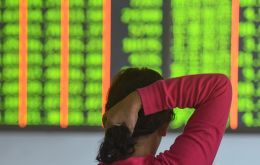
The International Monetary Fund has warned that escalating trade tensions could undermine global economic growth. In a new report on the world economic outlook, the IMF also warns of risks from a no-deal Brexit. For the world economy, the IMF is now predicting growth of 3.5% in 2019. In October, it forecast 3.7%.
-
Tuesday, January 22nd 2019 - 09:51 UTC
Cameron was warned about the referendum by EU leaders: “get real” over “this stupid referendum”

The European Council President Donald Tusk told David Cameron to “get real” over his “stupid referendum” before the 2016 Brexit vote, a BBC documentary reveals. Mr Tusk tells the three-part show that he warned the then prime minister there was no “appetite for revolution in Europe” and he “could lose everything”.
-
Tuesday, January 22nd 2019 - 09:04 UTC
Australian firm will use revolutionary blockchain platform to track its toothfish

WWF-Australia and BCG Digital Ventures launched a revolutionary new digital platform that uses blockchain and other technologies to track food and products, and that will help people and business to avoid illegal, environmentally-damaging or unethical products.
-
Monday, January 21st 2019 - 09:05 UTC
China's economy expands at its slowest rate since 1990
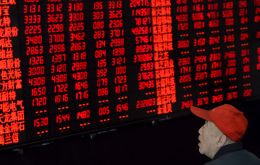
China's economy continued to slow in the last quarter of 2018, official figures showed, stoking fears about the impact on the global economy. In the three months to December, the economy grew 6.4% from a year earlier, down from 6.5% in the previous quarter. For the full year China expanded at 6.6%, its slowest rate since 1990.
-
Monday, January 21st 2019 - 08:19 UTC
Vessels leaving Vigo for the Falklands' Loligo season; Argentina reports good catches of Illex
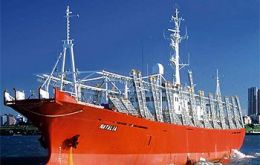
While the Spanish fleet of fishing vessels, many of them partners of Falkland Islands companies have started leaving Vigo for the South Atlantic to begin the Loligo season on 24 February, Argentine licensed jiggers operating south of parallel 44 have been catching some 25 tons per day per vessel of Illex, according to the first reports from Pescare.com.ar.
-
Sunday, January 20th 2019 - 05:07 UTC
Lopez Obrador vows to end fuel theft; dozens die when thieves puncture gasoline pipeline

Mexico’s president vowed on Saturday to redouble his fight against an epidemic of fuel theft after thieves punctured a pipeline north of Mexico City, causing an explosion that killed at least 73 people and injured 75 others. The blast underscored the deadly perils of the fuel-theft racket, which has cost the government billions of dollars a year and has been the target of a weeks' long crackdown by the administration of Mexico’s new president, Andrés Manuel López Obrador.
-
Saturday, January 19th 2019 - 09:28 UTC
Brazilian lawmakers trip to China triggers strong controversy among Bolsonaro's bunker

A trip to China by lawmakers from Brazilian President Jair Bolsonaro's party has stirred anger in the far-right leader's entourage, partly because of his wariness of the Asian power but also because of the group's stated mission. The delegation of eight members of Bolsonaro's ultraconservative Social Liberal Party (PSL) said it was on the visit to check out Chinese facial-recognition technology, with a view to it maybe being used in Brazil to combat crime.
-
Saturday, January 19th 2019 - 09:13 UTC
Argentina complies with IMF 2018 primary fiscal deficit target: 2.4% of GDP

Argentina outperformed its primary fiscal deficit target for 2018, Economy Minister Nicolas Dujovne said on Friday, assuring that the country’s standby finance deal with the International Monetary Fund remains on track.
-
Saturday, January 19th 2019 - 08:36 UTC
Leading Germans in an open letter ask UK to remain in the EU
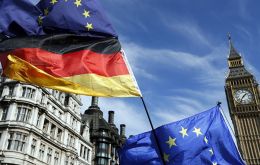
Leading German figures have written to the UK asking it to stay in the European Union. The letter, published in The Times, is signed by 31 people, including the leader of the Christian Democratic Union - and likely successor to Angela Merkel - Annegret Kramp-Karrenbauer and former Arsenal goalkeeper Jens Lehmann.
-
Friday, January 18th 2019 - 10:19 UTC
Doubts about Brazil's real soybean production estimate because of adverse weather
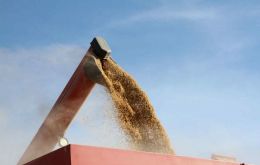
Analysts are casting doubt on the Brazilian government’s soybean production estimate. Conab, the government’s food supply and statistics agency, recently issued a forecast for 118.8 million tons of production, only slightly smaller than last year’s record 119.4 million tons.
